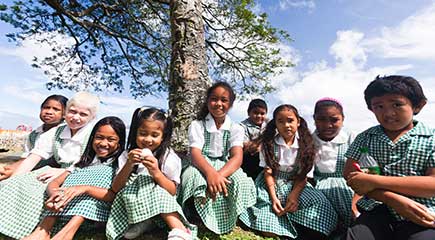Human development is the process of enlarging people’s capabilities and choices so that they can live full, creative and stable lives in freedom and dignity. Receiving an education, living a long and healthy life, and enjoying a good living standard are indispensable for individuals, as well as for the socio-economic development of communities. This is one area where Japan can make full use of its unique know-how cultivated in Japan and through the experience of providing assistance to developing countries during the past few decades. Faced with changes in the global context of human development, it is becoming more important than ever to create evidences and empirical knowledge and disseminate this to the world in a way that will guide the direction of future development policy and strategy.
Key research topics include the history of Japan's international cooperation in education, the impact of studying abroad, the acceleration of universal health coverage (UHC), and Japan’s international cooperation and development experience in health care. Moreover, we aim to strengthen collaboration with global research institutes and expand our intellectual networks.












scroll